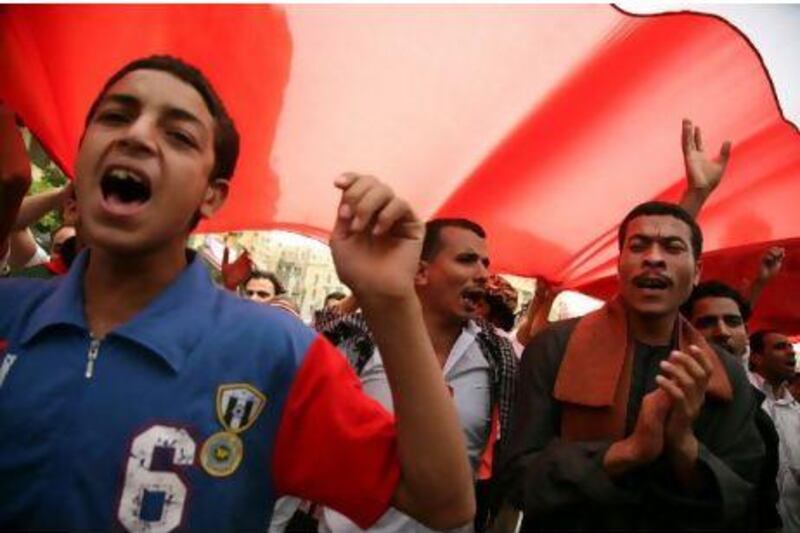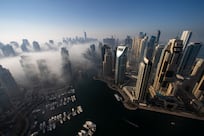CAIRO // Chanting "persistence" and "justice", thousands of Egyptians poured into Tahrir Square yesterday to rally against the slow pace of reform by the military government, more than two months after Hosni Mubarak was pressured to step down as president.
"The government does not respond without pressure," said Dina Khalil, 27, an economics researcher sitting near Omar Makram mosque at the edge of the square. "We're fed up with having to come to Tahrir every time to get what we want."
Ms Khalil said the protesters'demands included more transparent trials of politicians and businessmen, and postponing September's presidential elections until a new constitution could be drawn up.
But without demonstrations in the square, progress would slow to a near-halt, she said. "We're disappointed."
The return to Tahrir Square came just days after a failed attempt by the government to create a "national dialogue" conference this week with representatives of different political parties.
Dozens of members of youth groups walked out in protest against the inclusion of former National Democratic Party officials tied to the regime of Mr Mubarak.
In a sermon before afternoon prayers in the square, the imam, Mazhar Shaheen, said revolutionaries had returned to Tahrir to demand free and open trials for corrupt officials and speedier reforms.
"Do your job well and you will not find anyone in Tahrir Square," the imam said, addressing his remarks to the Supreme Council of Armed Forces.
He then offered a more conciliatory tone: "We and the army are one hand. Together we will fight corruption."
A major topic of debate among protesters and political groups has been how the country will be ruled until a new government is elected.
Some groups, such as the April 6 Youth Movement and the Popular Committees for the Defence of the Revolution, are calling for a civilian presidential council to take over the government.
Others, including the Muslim Brotherhood, have argued such a council would slow Egypt's path to stability and was not wanted by the Egyptian people.
Mikkawi Meligi, 22, a freelance graphic designer at Tahrir Square, called on the government to provide more jobs and unemployment benefits.
Mr Meligi held a sign addressed to Dr Essam Sharaf, the prime minister: "Sharaf, excuse me. You ran out of credit. Please recharge your government."
"Our demands are not fulfilled," he said, referring to Mr Mubarak being held in custody in a hospital. "We will not rest while Mubarak is still sitting in Sharm el Sheikh. We want a trial."
Youth groups suffered a blow in March when most citizens voted to amend the constitution rather than rewrite it.
The vote was considered a win for the Muslim Brotherhood, which has backed less dramatic reforms for the country before a new president is elected.
If elections go ahead as planned, analysts have said the Muslim Brotherhood is poised to win a large number of parliamentary seats. But there is division among its ranks.
While the official Muslim Brotherhood said it was against yesterday's demonstrations, the youth wing of the group came out in force in Alexandria to show their support for quicker reforms.
Earlier yesterday, four liberal and secular groups issued a joint statement calling for the elections to be delayed, new laws to ensure Egypt is a civil state, and ending military tribunals against protesters who clashed with the authorities during the revolution.
Observers warned this week that the event could lead to clashes with counter-revolutionary groups or the authorities, but the protests yesterday were peaceful and had a carnival atmosphere with music, trinket sellers and speeches from politicians and judges.
Young men and women created makeshift checkpoints around the square as they had done in the more raucous days of the revolution.
The crowd was not as large as some organisers had hoped. The event was originally described as a "million-man march", but estimates on the ground put the number of participants closer to 15,000.





